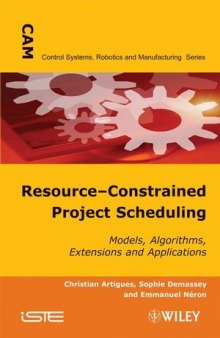 جزییات کتاب
جزییات کتاب
This title presents a large variety of models and algorithms dedicated to the resource-constrained project scheduling problem (RCPSP), which aims at scheduling at minimal duration a set of activities subject to precedence constraints and limited resource availabilities. In the first part, the standard variant of RCPSP is presented and analyzed as a combinatorial optimization problem. Constraint programming and integer linear programming formulations are given. Relaxations based on these formulations and also on related scheduling problems are presented. Exact methods and heuristics are surveyed. Computational experiments, aiming at providing an empirical insight on the difficulty of the problem, are provided. The second part of the book focuses on several other variants of the RCPSP and on their solution methods. Each variant takes account of real-life characteristics which are not considered in the standard version, such as possible interruptions of activities, production and consumption of resources, cost-based approaches and uncertainty considerations. The last part presents industrial case studies where the RCPSP plays a central part. Applications are presented in various domains such as assembly shop and rolling ingots production scheduling, project management in information technology companies and instruction scheduling for VLIW processor architectures.Content: Chapter 1 The Resource?Constrained Project Scheduling Problem (pages 19–35): Christian ArtiguesChapter 2 Resource and Precedence Constraint Relaxation (pages 37–48): Emmanuel NeronChapter 3 Mathematical Programming Formulations and Lower Bounds (pages 49–62): Sophie DemasseyChapter 4 Constraint Programming Formulations and Propagation Algorithms (pages 63–72): Philippe Laborie and Wim NuijtenChapter 5 Branching Schemes for Branch?and?Bound (pages 73–85): Emmanuel NeronChapter 6 Heuristics (pages 87–105): Christian Artigues and David RivreauChapter 7 Benchmark Instance Indicators and Computational Comparison of Methods (pages 107–135): Christian Artigues, Oumar Kone, Pierre Lopez, Marcel Mongeau, Emmanuel Neron and David RivreauChapter 8 Preemptive Activities (pages 137–147): Jean DamayChapter 9 Multi?Mode and Multi?Skill Project Scheduling Problem (pages 149–160): Odile Bellenguez?Morineau and Emmanuel NeronChapter 10 Project Scheduling with Production and Consumption of Resources: How to Build Schedules (pages 161–170): Jacques Carlier, Aziz Moukrim and Huang XuChapter 11 Activity Insertion Problem in a RCPSP with Minimum and Maximum Time Lags (pages 171–190): Christian Artigues and Cyril BriandChapter 12 Reactive Approaches (pages 191–201): Christelle Gueret and Narendra JussienChapter 13 Proactive?reactive Project Scheduling (pages 203–211): Erik Demeulemeester, Willy Herroelen and Roel LeusChapter 14 RCPSP with Financial Costs (pages 213–226): Laure?Emmanuelle DrezetChapter 15 Assembly Shop Scheduling (pages 227–242): Michel Gourgand, Nathalie Grangeon and Sylvie NorreChapter 16 Employee Scheduling in an IT Company (pages 243–255): Laure?Emmanuelle Drezet and Jean?Charles BillautChapter 17 Rolling Ingots Production Scheduling (pages 257–266): Christoph Schwindt and Norbert TrautmannChapter 18 Resource?Constrained Modulo Scheduling (pages 267–277): Benoit Dupont de Dinechin, Christian Artigues and Sadia Azem



 دانلود کتاب
دانلود کتاب

 جزییات کتاب
جزییات کتاب





 این کتاب رو مطالعه کردید؟ نظر شما چیست؟
این کتاب رو مطالعه کردید؟ نظر شما چیست؟
